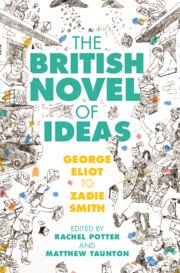Book contents
- The British Novel of Ideas
- The British Novel of Ideas
- Copyright page
- Contents
- Contributors
- Dedication
- Introduction The British Novel of Ideas
- Part I 1850–1900
- Part II 1900–1945
- Part III 1945–1975
- Part IV 1975–Present
- Chapter 20 Comedy, Sincerity, and Hypocrisy in the Novel of Ideas
- Chapter 21 Malcolm Bradbury
- Chapter 22 Hanif Kureishi
- Chapter 23 Ian McEwan
- Chapter 24 Kamila Shamsie
- Chapter 25 Zadie Smith
- Bibliography
- Index
Chapter 20 - Comedy, Sincerity, and Hypocrisy in the Novel of Ideas
from Part IV - 1975–Present
Published online by Cambridge University Press: 05 December 2024
- The British Novel of Ideas
- The British Novel of Ideas
- Copyright page
- Contents
- Contributors
- Dedication
- Introduction The British Novel of Ideas
- Part I 1850–1900
- Part II 1900–1945
- Part III 1945–1975
- Part IV 1975–Present
- Chapter 20 Comedy, Sincerity, and Hypocrisy in the Novel of Ideas
- Chapter 21 Malcolm Bradbury
- Chapter 22 Hanif Kureishi
- Chapter 23 Ian McEwan
- Chapter 24 Kamila Shamsie
- Chapter 25 Zadie Smith
- Bibliography
- Index
Summary
Critical discussions of the novel of ideas have often asked us to take seriously the ideas articulated by fictional characters, and assumed that these ideas are sincerely held by those characters. This is in fact a good description of the serious novel of ideas, whose formal dynamics can be mapped onto theories of tragedy by Hegel, Lukács, and David Scott. But often, comedy and hypocrisy disrupt the presumed continuity between public utterances and private convictions or behaviours. This also often involves disrupting essentialist conceptions of identity and group belonging. Through readings of novels by Rose Macaulay, Doris Lessing, Jonathan Coe and Jeanette Winterson, this chapter argues that comic novels of ideas thrive on such discontinuities, diffusing and deflating identity categories as well as tragic collisions, and offering a distinctive orientation towards discursive liberalism as the primary medium of politics.
Keywords
- Type
- Chapter
- Information
- The British Novel of IdeasGeorge Eliot to Zadie Smith, pp. 341 - 360Publisher: Cambridge University PressPrint publication year: 2024

